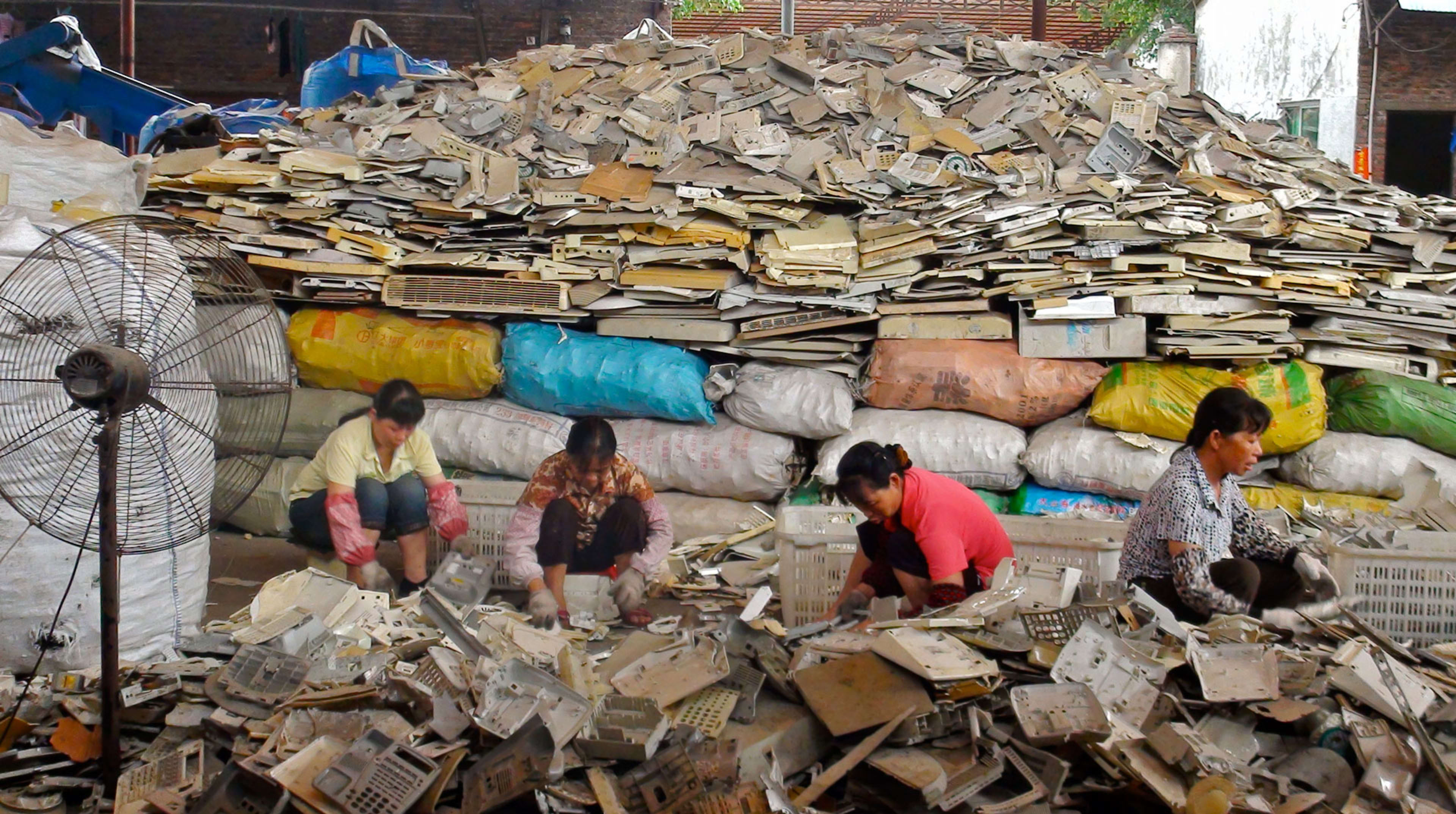Like any good millennial, I think about my smartphone, to the extent that I do at all, in terms of what it does for me. It lets me message friends, buy stuff quickly, and amass likes. I hardly ever think about what it actually is—a mass of copper wires, aluminum alloys, and lithium battery encased in glass—or where it goes when I upgrade.
Chen Qiufan wants us to think about that. His debut novel, Waste Tide, is set in a lightly fictionalized version of Guiyu, the world’s largest electronic waste disposal. First published in Chinese in 2013, the book was recently released in the U.S. with a very readable translation into English by Ken Liu.
Chen, who has been called “China’s William Gibson,” is part of a younger generation of sci-fi writers who have achieved international acclaim in recent years. Liu Cixin became the first Chinese to win the prestigious Hugo Award for his Three Body Problem in 2015. The Wandering Earth, based on a short story by Liu, became China’s first science-fiction blockbuster when it was released in 2018. It was the highest-grossing film in the fastest-growing film market in the world last year and was recently scooped up by Netflix.
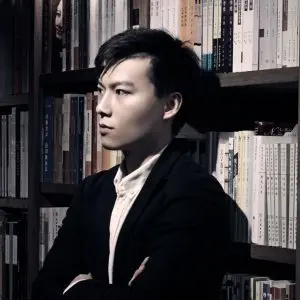
For the decades China was revving its economic engine, authorities were content to turn a blind eye to the human costs of the recycling business. It was an economic win-win. For developed countries like the U.S., it’s cheaper to ship waste to places like China than trying to recycle it themselves. And these shipments create jobs and profits for the Chinese.
In recent years, however, steps have been taken to protect workers and the environment in China. After a documentary about the human and environmental costs of recycling in China went viral, the country banned imports of the world’s tossed plastic, paper, and other solid trash. Even Guiyu followed suit by mandating recyclers to move into an indoor industrial facility. The move contained pollutants somewhat but also led to lower wages.
Waste Tide highlights the danger of “throw-away culture,” says Chen, also known in English as Stanley Chan. When our personal electronics stop serving us, whether because they break or our lust for the newest specs get the better of us, we toss them. Hopefully we’re conscientious enough to bring them to local recyclers that claim they’ll dispose of them properly. But that’s likely the end of our engagement with the trash. Out of sight, out of mind.
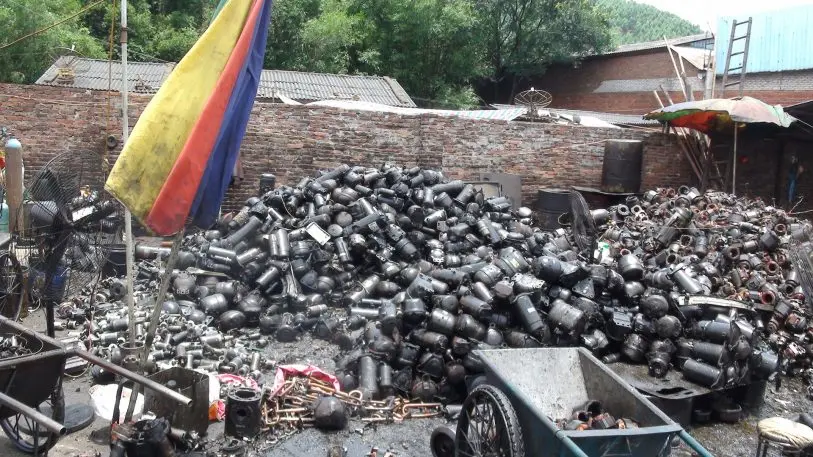
Fiction, and science fiction in particular, is an apt medium for Chen to probe the consequences of this arrangement. “It’s not journalism,” he says. Instead, the story is an imaginative, action-packed tale of power imbalances, and the individual characters that think they’re doing good. Waste Tide culminates, expectedly, in an insurgency of the workers against their exploitative overlords.
Guiyu has been fictionalized in Waste Tide as “Silicon Isle.” (A homophone of the Chinese character “gui” translates to “Silicon,” and “yu” is an island). The waste hell is ruled by three ruthless family clans, dominated by the Luo clan. They treat workers as slaves and derisively call them “waste people.”
Technology in the near-future has literally become extensions of selves and only exacerbates class inequality. Prosthetic inner ears improve balance; prosthetic limbs respond to mental directives; helmets heighten natural senses. The rich “switch body parts as easily as people used to switch phones.” Those with fewer means hack discarded prosthetics to get the same kick. When they’re no longer needed, synthetic body parts contaminated with blood and bodily fluids are added to the detritus.
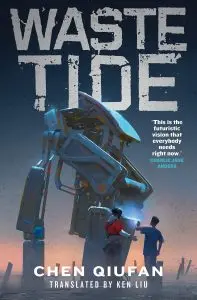
At the center of the story is Mimi, a migrant worker who dreams of earning enough money to return home and live a quiet life. She strikes up a relationship with Kaizong, a Chinese-American college graduate trying to rediscover his roots. But the good times are short-lived. The boss of the Luo clan becomes convinced that Mimi holds the key to rousing his son from his coma and soon kidnaps the hapless girl.
For all the advanced science, there is a backwards superstition that animates Silicon Isle. The clan bosses subscribe to “a simple form of animism.” They pray to the wind and sea for ample supplies of waste. They sacrifice animals (and some humans) to bring them luck, and use local witches to exorcise evil spirits. Boss Luo has Mimi kidnapped and tortured in an effort to appease the gods in the hopes of waking up his comatose son. The torture of Mimi infects her with a mysterious disease that splits her consciousness. The waste people are enraged by her violation, which eventually sparks a war against the ruling clans.
A parallel narrative involves an American, Scott Brandle, who works for an environmental company. While in town trying to set up a recycling facility, he stumbles onto the truth about the virus that may have infected Mimi: a chemical weapon developed and used by the U.S. years earlier. Invented by a Japanese researcher working in the U.S., the drug is capable of causing mass hallucinations and terror. When Brandle learns that Mimi may have been infected with this virus, he wants a piece of her too, so that scientists back home can study its effects.
Despite portraying the future of China in a less-than-positive light, Waste Tide has not been banned–a common result for works that displease Beijing; instead, the book won China’s prestigious Nebula award for science fiction, and is about to be reprinted on the mainland. I recently spoke with Chen about the themes in his work, as well as the capacities of science fiction in an increasingly tumultuous, uncertain world. Our interview has been edited for clarity.
Fast Company: What’s the role of science fiction when it comes to providing social commentary?
Chen Qiufan: Science fiction as a genre is beyond the limits of realism because it has another layer: metaphor. It’s beyond time or exact location. Historically, science fiction was a tool to criticize society, to bring up serious issues. But its function is bigger now. We’re creating narratives that are deeply embedded with worries of everyone around the world about technology and science. The discourse involves not just politics, but also ecology, anthropology, sociology. It’s not just criticizing, but offering imaginative solutions to society.
FC: It’s clear Waste Tide highlights the negative impacts of technology. Did you also intend for this story to be seen as a criticism of what’s happened in Guiyu?
CQ: I didn’t intentionally criticize a specific city or the Chinese government. Every character thinks they’re doing right, but the result is injustice, so it’s not all black and white. Everyone is a murderer to Mother Earth. I tried to bring complexity and hyper-reality to reflect our postmodern life. At the end of the novel, there is a certain compromise on behalf of the different powers so that they might get to a peaceful outcome. I hope it tries to make everyone think about themselves and their living condition, and how they should change their own ways.
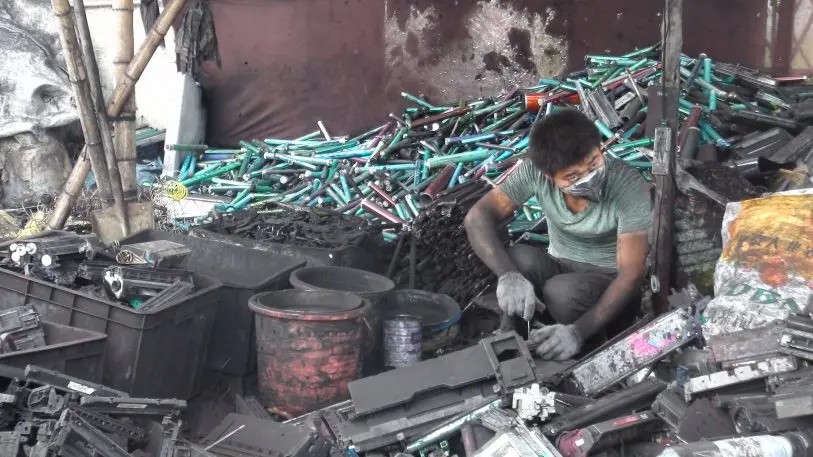
CQ: To me, the most important core of sci-fi is bringing up questions. These questions might strongly be related to social issues or readers’ real lives. That’s very critical to me. I don’t believe technology can solve everything, I don’t believe logic or rationality can be the ultimate solution to society. I didn’t simply criticize Chinese society or American living style, but wanted to show how complex the systems are. In this book, I wanted to bring some attention to the recycling industry, hopefully to bring more protection to the workers, or get more transparency.
FC: I think what you do so well, in your short stories, too, is reflecting the reality of what’s happening really in China, and introducing consequences people might not think about. Like your story A History of Future Illness, (available in the anthology Broken Stars) deals with how iPad use will infect generations of babies with neurological diseases. How does the reality of China inspire you?
CQ: I always try to create an atmosphere of the negative aspects of technology, even when it’s placed in good hands. Economically, China went through 40 years of fast development, whereas it happened in 200 years in the West. Everything happens so fast. We have no time or space to digest the impact of technology that makes your life more convenient, or to think about how it changes the way you interact with people. This all happened in the previous few decades. I think science fiction is a perfect genre to represent this kind of shock to our readers.
FC: Liu Cixin is an engineer by training, which often explains his prowess at explaining scientific concepts in his novels. You majored in Chinese literature and film arts and have worked in marketing in big tech companies including Google and Baidu. How has your background influenced your fiction?
CQ: China produces a lot of engineers; its leaders almost all have engineering degrees. The result is that the humanities were often ignored. You can see a lot of problems arising from thinking that engineers can solve all the issues using their techniques: a student died trying a medical treatment that Baidu listed at the top of its search results without checking; Didi [the popular ride-hailing company] was held responsible by the government when one of its users was raped and murdered. I don’t believe technology, logic, or rationality can solve everything in society. Humanity is always important in my work.
I’ve changed a lot in recent years. I used to try to be cool and unemotional like Spock. But now I think he’s kind of lame, because you need to build strong connections to people. It’s very important to have a sense of empathy, which I think is the fundamental element of human civilization.
FC: How technology can change bodies is a theme in Waste Tide. Why was this element important to you?
CQ: Most people don’t realize how technology affects their physical body. I think in the near future, body modification will become real and it will change how we perceive and interact with the world and each other. It’s already happening. For example, previously, we learned how to write Chinese characters in stroke order. But now, in the digital era, we learn how to write in a Roman way, collecting Romanized letters to form Chinese characters. That’s just one tiny place where your brain, and your fingers, will change with technology.
FC: Why are there so many backwards traditions in Silicon Isle, in a future that has so much advanced technology?
CQ: I see a lot of similarities between old rituals and modern societies’ use of technology. One thousand years ago, our ancestors tried to connect to gods using shamans, drums, dancing and singing, and herbal drugs. Now, we seek the same feeling through concerts, techno music, and virtual reality. Chinese people might use new technology, but they use it to enhance their own power, class, or their own perspective. There are animal sacrifices, witches, rituals, but using new technology. Technology tries to bring the same state of mind, to have some sort of dialogue with a higher existence and to console some real-life anxiety or confusion. It’s also a reality I’m familiar with. Whereas Westerners might go see a therapist, Chinese people will go pray in a temple.
FC: What’s been the response within China to your novel?
CQ: A lot of readers have told me it helped them see a different reality. This book is more realistic than one with aliens. I think it changes the way readers perceive the genre, and how complicated this situation is. I don’t simply criticize a Chinese or American way of living, I show readers how complex the systems are.
FC: How conscious are you, when you start writing a story, of the fact that books that displease the Chinese government get banned?
CQ: We know there are some areas you don’t want to touch, like minorities, religion, directly criticizing government—those are beyond the limits. Otherwise, I think it’s okay. You can see some Cultural Revolution within the Three Body Problem. You will not put these themes criticizing certain parties. You always try to bring in questions during the narrative, because it’s not black and white.
FC: Are you optimistic or pessimistic about the future of China? How do you use your fiction to communicate this?
CQ: I’m optimistic. I have some very young readers and friends. They have the power to shape the future. I think it’s more important to engage with the younger generation, because it’s so difficult to change the mind-set of older people. So I think we have to influence the future through science-fiction narratives, not in a radical way, but in a way to help young people be more imaginative. I’d like to tell them through my work: You have to be very independent, judge things by yourself, not according to the media, textbooks, the information you were told within your info cocoon. You have to reach out to build up some authentic connection to real, diverse people, and to be open.
FC: How do you hope English speakers, most of whom are not familiar with Chinese culture, will receive your work?
CQ: It’s important to bring the diversity and authenticity of China to Westerners because China is so huge. Different people in different parts speak different languages and have different perspectives. It’s important to never to make presumptions, such as thinking China as a whole is flat. Ken Liu did a fantastic job in his translation of representing the different topolects [or regional dialects], which bring in nuances of Chinese society. Topolects can show the hierarchy and power within the system. I think it’s very important to show this whole picture of Chinese culture to Westerners.
FC: China has taken more steps to protect the environment in recent years. In the U.S., this has led to what some have called a recycling crisis. What do you hope the impact will be of your book on how people in the U.S. think about these issues?
CQ: I hope Western readers will start to think carefully about throw-away behavior. If you dump your garbage into someone’s backyard, it creates some economic development but causes a huge disaster to the environment and to people. I hope this will spark some serious discussions on the topic from readers and even scientists, and that we’ll have some action on this issue. It might be easier outside of China to have certain level of action on e-waste—to bring global regulations, more protection to workers, more transparency.
Chen’s Waste Tide is out in English translation by Ken Liu. Read an excerpt here.
Recognize your brand’s excellence by applying to this year’s Brands That Matter Awards before the early-rate deadline, May 3.
